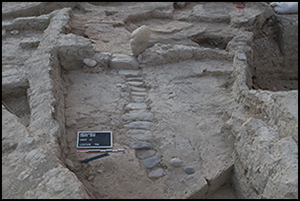Article contents
Scalar differences: temporal rhythms and spatial patterns at Monjukli Depe, southern Turkmenistan
Published online by Cambridge University Press: 17 February 2016
Abstract

New investigations at the site of Monjukli Depe in southern Turkmenistan challenge traditional ideas regarding the distinction between the Neolithic and the Aeneolithic in this region. It had previously been argued that the former (the ‘Jeitun’ culture) represented an expansion of agricultural villages from Mesopotamia, while the latter (best known from the site of Anau) marked the incorporation of local Iranian elements. By integrating multi-scalar analyses of the layout, architectural design and patterning of different household activities at Monjukli Depe, a more nuanced interpretation of temporal and spatial variability of the site's successive occupations becomes possible. The new insights afforded by this approach show that the contrast between the Neolithic and Aeneolithic may not have been as clear-cut as has traditionally been believed.
Information
- Type
- Research
- Information
- Copyright
- Copyright © Antiquity Publications Ltd, 2016
References
- 4
- Cited by

